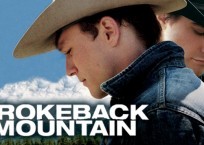
Once again, a public high school English teacher pokes a stick in the eye of conservative parents and taxpayers. Hinsdale South High School English teacher Kristin Wimsatt is teaching a senior elective “Film as Lit” class. Her curriculum includes the films Brokeback Mountain, American Beauty, Eternal Sunshine of the Spotless Mind, and Fargo. The two most egregiously offensive are Brokeback Mountain and American Beauty.
Just to remind readers, American Beauty is the story of a depressed middle-aged man Lester, played by Kevin Spacey, who becomes infatuated with his 16 year-old daughter’s best friend about whom he entertains sexual fantasies and with whom he flirts. His equally miserable wife played by Annette Bening has an affair. A secondary story line involves a brutal conservative ex-Marine neighbor who is a closeted homosexual and ultimately murders Lester.
There are a number of questions that school administrators and board members should be asking. While this dark film critiques America, might it also cultivate dark and prurient thoughts in viewers? Might the sexual imagery be sexually arousing to some of Wimsatt’s students? Might the depiction of the neighbor reinforce the stereotype of conservatives as vicious hatemongers? Are subsequent classroom discussions sufficient to mitigate the damage done by the powerful narrative and images?
The other controversial film selected by Wimsatt is Brokeback Mountain, the story of two men who are hired by a rancher to herd his sheep and in the process become enmeshed in a sexual and emotional relationship that lasts for years, including through the dissolution of both of their marriages.
Click here and here to read two short lists of some of the offensive images in these films (warning: descriptions are graphic). As you’re reading the list of images from Brokeback Mountain, you should know that Wimsatt, describes these images as “tasteful.”
Here is Wimsatt’s justification for choosing these two films:
The primary objective in viewing Brokeback Mountain is to evaluate the film from the perspective of the text as an adaptation. In fact, one of the three Oscars it won was for “Best Writing & Adapted Screenplay.” The Annie Proulx short story, originally published in the New Yorker, is quality writing, and both the story and the film are texts that most of the students have not encountered. I like the film particularly because it was originally a short story (as opposed to a novel), thus the process of adaptation posed more of a challenge. I think the class will have a lot to discuss with this one. The prose is challenging, but the film is a good “payoff” for them in terms of viewing, particularly because it has such a good star appeal at this point in our culture.
The sexual element, while provocative, is tasteful. Naturally, we will discuss the standard literary elements of plot, theme, symbolism, etc., but again, the primary focus is on how the film holds up to (or surpasses) the original script….
I have given a lot of thought to these selections and, after consulting with colleagues and my department chair, have chosen a few that do contain more difficult material…. The sexual aspects of the film do not necessarily “advance the teaching of adapting text,” but they are nonetheless an integral part of what is, overall, a valuable and powerful story (as are so many rated R films!)…. I have often contended that when students consume films of a more graphic nature in a safe and structured classroom environment, they have an opportunity to process the content in a more thoughtful way, as opposed to a point in his life when he is more likely to watch it alone or with friends and not be able to have mature conversations about it.
Ah, yes, the ever utilitarian appeal to plot, theme, and symbolism. As I’ve written before, the beauty of teaching literature is that text-selection criteria are almost infinitely elastic. Literature and film teachers can find “reasons” to justify selecting virtually any film, play, novel, or essay they want to teach. After all, what text can be found that has no theme, no plot, no characterization, no dialogue, no setting, no symbols, and no figurative language? In other words, with the breadth of reasons available, teachers can justify teaching anything their little hearts desire. And if challenged, they simply assume that the reasons offered by critics are subordinate to their reasons for teaching it.
So, let’s look more closely at the reasons Wimsatt offers for her film choices because they echo the reasons proffered by English teachers all over the country for their inappropriate text selections:
- Brokeback Mountain won three Oscars. Films are evaluated on the basis of a number of criteria, but one that Hollywood rarely considers is the moral vision that is depicted in the film. For those who care deeply about sexual morality, who understand that homosexual acts corrupt same-sex friendship and love, and that the presence of love does not render sexual interaction inherently moral, the film Brokeback Mountain is profoundly troubling. Through the interplay of narrative, imagery, and music, the film manipulates audience emotion to move them non-rationally to embrace a subversive and—dare I say—immoral sexual ethic.
Annie Proulx, author of the short story on which Brokeback Mountain is based—and no friend to conservatism—wrote this about the Academy Awards that so impress Wimsatt:
Roughly 6,000 film industry voters, most in the Los Angeles area, many living cloistered lives behind wrought-iron gates or in deluxe rest-homes, out of touch not only with the shifting larger culture and the yeasty ferment that is America these days, but also out of touch with their own segregated city, decide which films are good.
- Since Brokeback Mountain was adapted from a short story, the “process of adaptation posed more of a challenge,” which makes it all the more appealing to Wimsatt. Here are some other critically acclaimed films adapted from short stories that she could have chosen: Double Indemnity, The Third Man, The Innocents, The Heiress, Stand by Me, The Dead, Sleepy Hollow, 2001: A Space Odyssey, and The Birds.
- Perhaps anticipating that parents may suggest other films adapted from short stories, Wimsatt has a proleptically prepared her “justification”: She argued that Brokeback Mountain has a “good payoff…particularly because it has such good star appeal.”
Wimsatt never articulates precisely what she means by “good” or “payoff.” It might behoove parents to ask what she means and to ask her to define her conception of the “good.”
Wimsatt’s mention of a “good payoff” and “good star appeal” reveals something that may surprise parents and other taxpayers, which is that many English teachers are inordinately concerned with appealing to the “interests” of their students. That is why there are so many books, plays, and films being taught that include subversive ideas, graphic sex, obscene language, and extreme violence. These elements appeal to the baser, untutored sensibilities of adolescents—not to mention the adults who teach them. It’s easier to teach texts about which teens aren’t griping.
But why not teach films that students are unlikely to watch on their own, that pose adaption challenges, that are critically acclaimed, and that don’t offend the moral sensibilities of any students or their parents—particularly when the class and teacher’s salary are subsidized by the public?
- Wimsatt claims that the “sexual elements” in the film, though “provocative,” are “tasteful.”For those, however, who believe that same-sex attraction is disordered, and that same-sex acts are profoundly immoral, referring to homosexual acts as “tasteful” is oxymoronic. There can no more be tasteful depictions of homosexual acts than there can be tasteful depictions of group sex. Certainly there can be more or less graphic depictions of homosexual acts, but being less graphic scenes does not make them tasteful.
One of the serious problems with this film is that it powerfully depicts a homosexual relationship as a good thing. It uses the immense persuasive force of narrative and imagery to depict that which is perverse as good. Even without graphic sex, this film is troubling because its central thesis is flawed. Sex between two men does not ennoble their love; it corrupts it.
- Wimsatt “thought” a lot about which films to teach. The quantity of thought she’s given to her choices is irrelevant. People can give a lot of thought to decisions and still make terrible ones.
- She consulted her colleagues and department chair. English Departments are notoriously problematic. This does not mean every English teacher is a problem, but the fact that she consulted her colleagues and department chair is meaningless without knowing more about their discussion and their pedagogical vision.
- She defends the teaching of “difficult material.” The euphemistic description of subversive, “transgressive” sexuality; obscene language; and graphic images of sexuality as “difficult material” indicates Wimsatt and perhaps the entire English Department needs to define “difficult.”
- Wimsatt asserts that the “sexual aspects” of these two films are “valuable.” This is a highly debatable claim. Many people find the sexual aspects of the films corrosive. Should publicly funded schools that claim to honor all voices and respect diversity show films that many taxpayers find corrosive?
- And here’s the crowning rhetorical glory: Wimsatt argues that when students consume graphic films in a “safe and structured classroom environment,” they have the “opportunity to process content in a more thoughtful way” as opposed to when watching it alone or with friends where mature conversations can’t take place.
What does this even mean? “Safety” is the go-to term that public school teachers use to silence dissent. They know that if they assert that a resource or activity promotes “safety,” they win the debate. Or alternatively, if they assert that presenting a text will make students feel “unsafe,” it’s out.
At least as troubling is Wimsatt’s presumption that her students will be watching Brokeback Mountain and American Beauty alone or with friends. Since she already acknowledged that most students will not have seen the films, why would she presume they will be watching them alone or with their friends? She apparently hasn’t entertained the possibility that they might not watch them at all—ever. Wimsatt just might be exposing students to films that they would otherwise never watch, either alone or with their immature friends.
Has she, her colleagues, or her department chair discussed whether viewing and discussing scenes of nudity, masturbation, sodomy, and adultery might desensitize students to such images or efface natural and good feelings of modesty? Did they discuss whether the school-sanctioned showing of films that use egregiously obscene language might undermine school policies that prohibit the use of such language? It’s both absurd and dishonest to imply that words and images have no effect on the hearts and minds viewers.
As usual, parents who are troubled by these films have been offered the inadequate option of having their children receive an alternative assignment during the time the class will be viewing and discussing the inappropriate films. This, obviously, results in an isolated, diminished academic experience. Or they can drop the class entirely.
Here’s a wacky idea: Why not drop both films and replace them with films that will challenge students intellectually, broaden their aesthetic lens, and respect the values and beliefs of all students and parents.
Take ACTION: If you object to the decision to teach these two films in a publicly funded school, please click HERE to respectfully express your views to the school superintendent, Dr. Nicholas D. Wahl, and the members of the local Board of Education. And if you know someone in the Hinsdale South community, please share this information with them. If we do nothing, the texts chosen by public teachers only get worse.
























